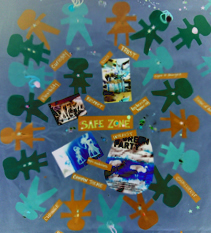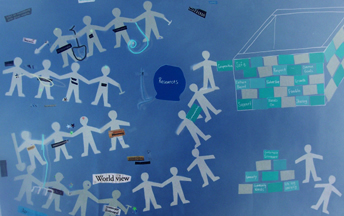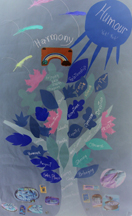The Widening the Circle Symposium brought
together representatives from several learning circles identified in
the study, and included representation from rural, urban, and Indigenous
communities. This gathering presented the research team with an opportunity
to hear directly from participants and facilitators about the impact
of learning circles on individuals and communities
In order to synthesize the impact of learning circles
on individuals and communities I have organized the discussion under
five distinct headings: holistic, spiritual (see), emotional
(feel), intellectual (think), and physical (act). These headings
arise from the data and offer a means of managing the collective
responses expressed by the group.
First and foremost a number of responses were “holistic” or
characterized by wholeness; that is spiritual, emotional, intellectual,
and physical aspects are present and extend outward to the total environment. “The
total environment” is the recognition of self in relationship
to family, community, Nation, and creation. One participant at the
symposium described this as recognizing that we are “part of
a larger picture.” Being part of a larger picture is
recognizing a shared human condition in which each person plays
a crucial role in the world and has something valuable to contribute.
This includes people taking ownership of and for what is happening
in their community and circle, building support networks, and assuming
responsibility for one another without ignoring the inherent autonomy
of individuals.
The symposium participants also spoke to the healing potential of
teaching and learning that occur in the circle and impact on participants.
The incidents they described were relationship-based and stemmed from
the development of friendships, partnerships with community organizations,
the inclusion of people with diverse heritage and experiences, as well
as intergenerational relationships in which young and old people teach,
support, and learn from one another. Learning circles are about people
and bringing people together to widen the circle for the purpose of
sharing and learning.
A number of the responses from the symposium participants
expressed spiritual connections and understandings that give strength
to the individual spirit. These reflections included the power and
strength of learning about one’s own culture, history, and identity; developing
trust in one’s self and therefore others; reciprocating
love, support, and encouragement to others; reconnecting
and communicating the joy of nurturing relationships. Symposium
participants shared both their observations and personal journeys
of exploring creativity, discovering personal resiliency, and uncovering
a belief in their own potential to learn. The gathering also established
that these spiritual connections have the potential to create a
ripple effect that extends beyond the learning circle and into
the community. As learning circle participants build confidence
and explore their inner strength they are better prepared and equipped
to pursue other challenges or have new courage to make positive
change in their lives and communities.
A number of participants from the symposium spoke
to the emotional quality and experience of learning circles. Learning
circles supported individuals in getting to know themselves on an
emotional level and challenged them to explore their own feelings
of grief, sadness, joy, and love. Some learning circles in the Indigenous
community, although focused on sewing or drumming create a space
for dealing with anger, unresolved grief, sadness, shame, and loneliness
in the safety and security of the circle environment. Emotional unburdening
is considered a natural and necessary component of personal growth
and life long learning in the Indigenous community. In other circles,
participants experienced feelings of commonality despite differences
in age, gender, and cultural heritage. Generally, participants identified
feelings of respect for one’s self and others; respect for space
and diversity; as well as mutual support and encouragement.
Participants talked about “being the only one” and how
learning circles fostered a space where participants could see and
feel that they were not alone or “the only one.” The
learning circle itself became a space of common ground, where the
circle participants could collectively give voice to the challenges,
injustices, or problems that are part of the human condition. Participants
felt a great sense of comfort in knowing that they were embraced
and valued by their learning circle.
Learning circles are intellectually stimulating and challenge participants
to explore new thought processes, problem solving, and decision making
techniques. Learning circles offer participants the opportunity to
share and explore their ideas on various topics or issues addressed
by their circle. This includes the opportunity to look at common problems
and issues together from various and diverse perspectives. Many felt
that the sharing of personal stories and lived experiences provided
a mechanism for breaking down barriers around racism and stereotypes,
and encouraged participants to develop greater appreciation for others
by becoming aware of their commonalities and respecting difference.
Learning circles also create other types of awareness, for example
it may introduce participants to programs and services that are available
to assist them. Learning circles empower individuals and communities
to explore learning on their own terms and within an environment that
is appropriate and comfortable for them.
Finally, learning circles impact individuals and communities on a
physical level in that they show us how to be in a group, break down
isolation by bringing people together in a circle, create a space for
action, encourage sharing and self expression in a safe space, as well
as reveal our individual and collective skills and abilities. Learning
circles can help participants to realize their gifts and discover amazing
things about themselves through theatre, music, sewing, cooking, telling
stories, organizing events, and more. The physical manifestation of
our gifts and the release of emotions through the body in the form
of tears and laughter can have a revitalizing effect and increase the
esteem and confidence of participants. Equally important are learning
circles that share and prepare food together as a means of providing
fellowship. Sharing food to nourish the body is symbolic of the nourishment
that we receive through participation in learning circles.















 National
Literacy Secretariat
National
Literacy Secretariat 

 NALD
NALD